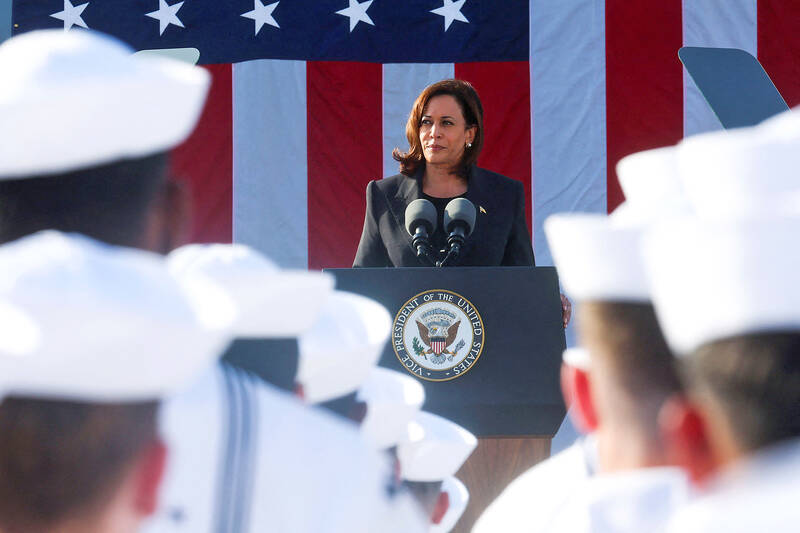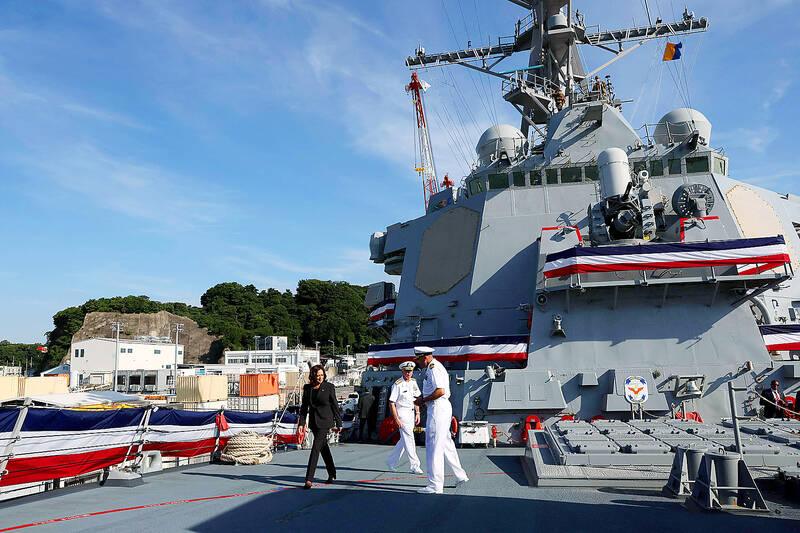US Vice President Kamala Harris on the deck of a US warship in Japan yesterday said that the administration of US President Joe Biden intends to deepen unofficial ties with Taiwan.
“Taiwan is a vibrant democracy that contributes to the global good — from technology to health, and beyond, and the United States will continue to deepen our unofficial ties,” Harris said aboard the USS Howard, an Arleigh Burke-class destroyer, excerpts of her speech released by the White House in advance showed.
She said that Beijing “has challenged freedom of the seas” and “has flexed its military and economic might to coerce and intimidate its neighbors.”

Photo: Reuters
Many have witnessed “disturbing behavior in the East China Sea and in the South China Sea, and most recently, provocations across the Taiwan Strait,” she said.
“The United States believes that peace and stability in the Taiwan Strait is an essential feature of a free and open Indo-Pacific,” Harris said.
Harris is on a four-day trip to Japan and South Korea intended to demonstrate US commitment to allies in the region.

Photo: AFP
The trip sets the stage for Biden’s visit to the region later this year, when he is expected to meet Chinese President Xi Jinping (習近平) and speak with allies about efforts to denuclearize the Korean Peninsula and address rising tensions over Taiwan.
Harris’ remarks to US sailors wearing dress whites came after Biden pledged in an interview aired on Sept. 18 to defend Taiwan against a hypothetical “unprecedented attack.”
Harris said that US forces would operate in the region “undaunted and unafraid” even as Washington expects “continued aggressive” actions by China.
“We will continue to oppose any unilateral change to the status quo,” she said. “And we will continue to support Taiwan’s self-defense, consistent with our long-standing policy.”
In Beijing, Chinese Ministry of Foreign Affairs spokesman Wang Wenbin (汪文斌) told a media briefing that Washington needed to return to the “one China” policy and “unequivocally make clear that it opposes all Taiwan separatist activities.”
Before Harris spoke to the US service members onboard the Howard, she stepped below deck and was given a demonstration of the warship’s missile and anti-submarine capabilities.
A commander pointed at a digital map showing a hypothetical enemy, a “hostile country” that he declined to identify.
“It’s not Guam,” he said.

CROSS-STRAIT COLLABORATION: The new KMT chairwoman expressed interest in meeting the Chinese president from the start, but she’ll have to pay to get in Beijing allegedly agreed to let Chinese Nationalist Party (KMT) Chairwoman Cheng Li-wun (鄭麗文) meet with Chinese President Xi Jinping (習近平) around the Lunar New Year holiday next year on three conditions, including that the KMT block Taiwan’s arms purchases, a source said yesterday. Cheng has expressed interest in meeting Xi since she won the KMT’s chairmanship election in October. A source, speaking on condition of anonymity, said a consensus on a meeting was allegedly reached after two KMT vice chairmen visited China’s Taiwan Affairs Office Director Song Tao (宋濤) in China last month. Beijing allegedly gave the KMT three conditions it had to

STAYING ALERT: China this week deployed its largest maritime show of force to date in the region, prompting concern in Taipei and Tokyo, which Beijing has brushed off Deterring conflict over Taiwan is a priority, the White House said in its National Security Strategy published yesterday, which also called on Japan and South Korea to increase their defense spending to help protect the first island chain. Taiwan is strategically positioned between Northeast and Southeast Asia, and provides direct access to the second island chain, with one-third of global shipping passing through the South China Sea, the report said. Given the implications for the US economy, along with Taiwan’s dominance in semiconductors, “deterring a conflict over Taiwan, ideally by preserving military overmatch, is a priority,” it said. However, the strategy also reiterated

‘BALANCE OF POWER’: Hegseth said that the US did not want to ‘strangle’ China, but to ensure that none of Washington’s allies would be vulnerable to military aggression Washington has no intention of changing the “status quo” in the Taiwan Strait, US Secretary of Defense Pete Hegseth said on Saturday, adding that one of the US military’s main priorities is to deter China “through strength, not through confrontation.” Speaking at the annual Reagan National Defense Forum in Simi Valley, California, Hegseth outlined the US Department of Defense’s priorities under US President Donald Trump. “First, defending the US homeland and our hemisphere. Second, deterring China through strength, not confrontation. Third, increased burden sharing for us, allies and partners. And fourth, supercharging the US defense industrial base,” he said. US-China relations under

The Chien Feng IV (勁蜂, Mighty Hornet) loitering munition is on track to enter flight tests next month in connection with potential adoption by Taiwanese and US armed forces, a government source said yesterday. The kamikaze drone, which boasts a range of 1,000km, debuted at the Taipei Aerospace and Defense Technology Exhibition in September, the official said on condition of anonymity. The Chungshan Institute of Science and Technology and US-based Kratos Defense jointly developed the platform by leveraging the engine and airframe of the latter’s MQM-178 Firejet target drone, they said. The uncrewed aerial vehicle is designed to utilize an artificial intelligence computer